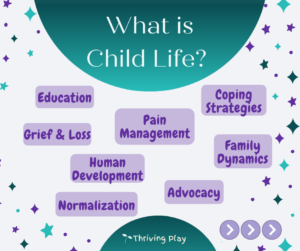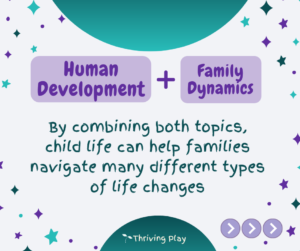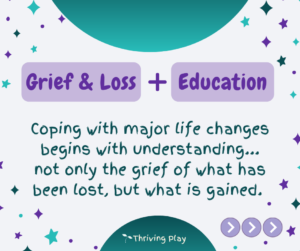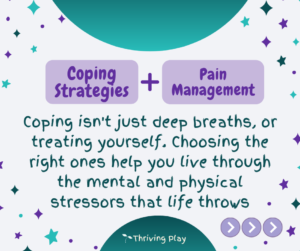Really, what is it?

If I had a dollar for every time I was asked the question…
But I’m not surprised. Child Life has been around for longer than many people realize, especially since it’s still not widely well known.
So I’ve gotten used to explaining what child life is.
Probably the hardest thing is figuring out how to keep it simple and to the point, because we do so many things!
Thus I give you my umpteenth attempt at explaining child life in a concise fashion.
Today I’m breaking child life into 6 different groups (but you can divide them in other ways too)

Human Development
By understanding how the human being develops over the years, we can assess and create interventions that are appropriate for the person’s developmental level, which will make it easier to achieve success. Imagine taking your car to a mechanic who doesn’t know how a car works. But the mechanic claims he can fix your car. It’s likely you will pull out your phone to look up a different mechanic fast. In the same way you wouldn’t expect the person who is helping your child to not know how a human grows. Before we try to assess a child or teen, we must understand human development. Want to learn more about how you can use human development to understand your child? Click here to learn more!
Family Dynamics
Let’s face it, we don’t live in a bubble away from other humans. The lives of the people around us (especially family members living under the same roof) impact how we grow and develop. So we can’t just look at a person during an assessment, we have to look at the family, even society as a whole! If we think of the mechanic example, you would also expect that a mechanic considers your driving needs. You wouldn’t want your mechanic to recommend tires for a hot climate when you live in the snowy north.

Grief & Loss
I don’t care what major life change you are experiencing, there is grief and loss that is happening. No one has to die for you to feel grief and loss. In fact, children and teens experience grief more than you probably realize. The grief of leaving a loved grownup to go to school. The grief of losing a favorite stuffed animal. Even the grief of growing out of a favorite outfit. Once that’s acknowledged, we can move towards healing.
Education
Children who understand are better able to cope. But we have to educate in a way they can understand. This step can not be skipped! In fact, education links back to human development. Kids who are in preschool aren’t expected to solve quadratic equations. Thus when teaching them about their physical and mental capabilities, we have to do it in an age appropriate manner. And by using the child or teen’s developmental stage as a guide, we can choose the best way to teach. Are you looking for some help in educating your young one? Click the link here to learn more about our health education sessions!

Coping Strategies
This one is usually the main reason we as child life specialists get called for help. So we use lots of different strategies since not every strategy is right for every situation. And believe it or not, coping isn’t just about taking deep breaths. It can mean using physical coping strategies like movement or mental coping strategies like guided imagery or positive self-talk. Which ones are you most familiar with? Leave your thoughts in the comments below!
Pain Management
Pain comes in all shapes and sizes. And while medication can definitely help, we can also treat pain with physical and psychological techniques. What to learn some? Leave a <3 in the comments below!

Normalization
A major change is not always fun, but it’s important to recognize that there are still normal things that are happening. In the world of child life we make sure that families take time to enjoy the normal things. Perhaps even celebrate the normal, especially if it’s a birthday or Thanksgiving! Not only that, but child life also recognizes that the abnormal can become normal… if we want. And that’s okay!
Advocacy
Once you know what you need, it’s important to tell others, right? Child life is often the family’s biggest advocates, regardless if it’s the hospital, school, or neighborhood. But that doesn’t mean that child life is the only advocate. If we didn’t teach families how to advocate for themselves, where would we be? The mark of a true child life specialist is one who makes sure the family can advocate for their needs even if child life isn’t available. Do you know what kind of advocacy we specialize in here at Thriving Play? It’s helping kids and teens with invisible illnesses advocate for themselves. Learn more here!
Interested in learning how Thriving Play can support your family? You can schedule a free 15 minute assessment by visiting this link!

